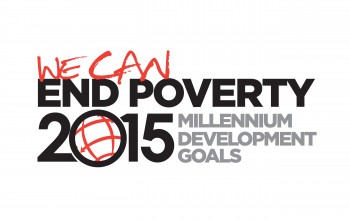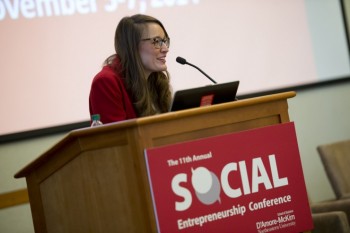The soon approaching deadline of 2015, by which all the world’s nations and leading development institutions agreed to meet eight Millennium Development Goals (MDGs), forces us to reflect on achievements and areas for improvement. In this vein, we must assess where we stand in terms of extreme poverty and hunger eradication, universal primary education, gender equality and female empowerment, child mortality, maternal health, HIV/AIDS, and malaria, to name a few.
Looking back, the MDGs represent an unprecedented organized effort to meet the most pressing needs of the world’s poorest. In terms of achievements, one should note the enormous progress that has been made: global poverty continues to decline; more children than ever are attending primary school; child deaths have dropped dramatically; access to safe drinking water has been greatly expanded; targeted investments in fighting malaria have been made; millions have been saved from the threat of AIDS and tuberculosis. These accomplishments are due, in part, to the relentless and innovative efforts of social entrepreneurs and those who support them such as the Bill and Melinda Gates Foundation.
Keep in mind, however, that this is only the big picture. Many countries are still far from meeting their development goals. That is why some have argued that the MDGs should concentrate on what the so-called “The Bottom Billion” (Collier, 2008), instead of targeting the five billion people who live in the “developing world” and who are in fact getting richer at an unprecedented fast rate, The populations of 58 countries, mostly located in Africa and Central Asia, are stuck in what Collier calls traps (such as conflict, bad governance), which prevent almost any chance of economic development and growth. They are the ones who primarily need development assistance.
Angola, for instance, has shown impressive progress on several MDGs: the percentage of Angolans living with less than $2 a day decreased from 92% in 2000 to 54% in 2014 and hunger was reduced by 51.65%; life expectancy rose from 45.2 in 2000 to 51.9 in 2013; Angola is also one of four countries that has achieved to halve its population suffering from hunger (Trindade et al., 2015). While malaria is still the first cause of death for young Angolan children, much progress has been made and child mortality has been reduced by almost two-thirds between 1990 and 2010. In terms of education, literacy rates for those aged 15-24 have reached 80% for males, yet only 66% for females (Asulin et al., 2015). In addition, Angola has regressed in terms of gender gap in primary school enrolment, yet the percentage of women in Parliament has increased from 36.8% to 50%. While Angola’s progress is undeniable and some of these statistics are encouraging, efforts cannot halt in 2015. More than half of the Angolan population still lives below the poverty line, the mortality rate of children under five years old remains at 15%, and the prevalence of tuberculosis has increased significantly.
Nigeria furthers the case for continued effort, as its situation is even more alarming. While its GDP has grown on average 5% in recent years, the percentage of the population living on less than $1 a day has increased. This suggests widening economic disparity. In relation the MDGs, Nigeria is reported to be on track to achieve only one: universal access to primary education. Thanks to a targeted government program, 145,000 teachers have been retrained and 40,000 new teachers have been recruited, which brought literacy rates of 15-24 years old to 90% and improved the overall quality of education (Overton et al., 2015).
Building on Paul Collier’s criticism that the MDGs lack focus, moving forward, I would suggest an agenda more focused on the poorest of the poor and on the most pressing problems that are threatening their lives. The poorest of the poor, or the Bottom Billion, are the ones usually left behind, and despite enormous amounts of financial aid flowing into their countries, positive changes are still under way and require all our attention and intervention to become reality. In addition, the case of Angola suggests that our focus in the years to come should be on the poor’s most pressing needs in terms of access to reliable healthcare and gender equality, as women at the bottom of the pyramid are still more likely than men to perform jobs in the informal sector at lower wages.
Thankfully, a new, long-term agenda for Sustainable Development Goals is expected to be adopted by UN Member States in September 2015 to tackle additional issues. These will include: combating climate change, protecting oceans and forests, making cities more sustainable, and so on. The most pressing needs of the poorest of the poor, however, should not be pushed into the background. Furthermore, it can be argued that a robust health system is at least marginally required to sustain the achievements of all eight MDGs (Mbabazi, 2015). An effective, economical, and inclusive healthcare system that improves doctor-to-patient ratios, country-wide distribution of health workers, and access to healthcare facilities is thus urgently needed. Without a systematic solution, sustainability itself is compromised.
For those of us who are lucky enough to live in other parts of the world, let us all think of how, together, we can make our world a place that embraces the values of equity, freedom, dignity and peace. Our study of efficient models of social enterprises certainly remains a sustainable means to achieve our aims.

References:
Asulin, D., Moody, J., Cote, S., & Villalobos, C. (2015). Angola.
Collier, Paul (2008). The Bottom Billion: Why the Poorest Countries are Failing and What Can Be Done About It. Oxford University Press.
Collier, Paul (2010). Wars, Guns, and Votes: Democracy in Dangerous Places. Harper Perennial. p. 239.
Mbabazi, N. (2015). Millennium Development Goals Post-2015: For Sustainability, Focus on Health Systems. Diplomatic Courrier, January 26, 2015.
Overton, K., Pietsch, A., Riggs, W., & Bail, K. (2015). MDG Progress: Nigeria.
Trindade, A., Seeto, A., Parruitte, C., & Duff, K. (2015). Angola: Millennium Development Goals Progress.



